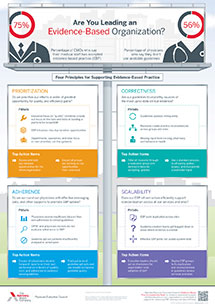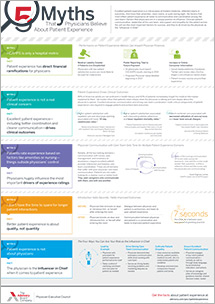Auto logout in seconds.
Continue LogoutDoctors for generations have spoken with reverence about the mysterious power of medical "intuition"—but how, exactly, can someone determine whether their intuitions are right or wrong? Daniel Kahneman, the Nobel-winning behavioral psychologist, recently outlined his three rules for when intuition is most likely to be trustworthy.
Cheat sheet series: Evidence-based medicine 101
What is medical intuition, anyway?
Many physicians can describe a time when they caught a problem or made a diagnosis based on hard-to-explain factors that don't appear on any medical chart.
For instance, Allan Peterkin, a physician and professor at the University of Toronto, wrote last year in the Canadian Medical Association Journal about an incident during his training that "continues to puzzle [him] more than 25 years later."
A seemingly healthy patient in his 40s arrived for a routine physical, and although the man was a longtime smoker, he presented no obvious signs of illness. Peterkin's supervisor instructed Peterkin that he should "definitely not" request a chest X-ray, as it was unlikely to turn up any concerns.
Peterkin agreed, in theory—but to his own surprise, he found himself ordering an X-ray anyway. It revealed a life-threatening cancer, which was successfully treated.
"I may have saved his life," Peterkin wrote, "but based on what?"
The answer, it appears, was Peterkin's own nascent medical intuition, which he noted that doctors commonly attribute to any of a variety of sources: "Psychic attunement triggered by fatigue. Synchronicity. Random chance. Hyperacuity of the senses. … Unconscious associations based on verbal and nonverbal cues. Even divine providence."
As mysterious as these explanations might sound, researchers have found hard evidence supporting the importance of medical intuition. In a recent study, researchers at the Massachusetts Institute of Technology studied records on 60,000 ICU patients to examine the connection between physicians' "gut feelings," as recorded in the notes accompanying patients' medical data, and the intensity of follow-up care. They uncovered a strong correlation, especially at the beginning of a patient's hospital stay, when medical data were sparse.
So when can intuition be trusted (and when can it be dangerous)?
In recent years, researchers have tried to use behavioral psychology to understand medical intuition—and especially to illuminate the hazards of relying too heavily on instinct. In the New England Journal of Medicine, for example, Pat Croskerry, the director of the Critical Thinking Program at Dalhousie University, wrote about the "pervasive influence" of more than 100 cognitive biases on doctors' diagnoses, blaming these biases in part for the fact that diagnoses are wrong up to 15% of the time.
But Daniel Kahneman, who won Nobel Memorial Prize in Economic Sciences for his groundbreaking work in behavioral psychology, argued recently that—despite its hazards—intuition can sometimes provide genuine insight.
In a speech at New York City at the World Business Forum, Kahneman defined intuition as "thinking that you know without knowing why you do." He emphasized, however, that you shouldn't trust an intuition just because it feels right. "In general," he said, "confidence is a very poor cue to accuracy."
Rather, Kahneman said, these three factors can indicate whether one's instincts are trustworthy:
- Regularity. If a phenomenon occurs regularly, it's more likely to be predictable and thus amenable to instinct. One example, Kaheman said, is chess: "Intuitions of master chess players when they look at the board [tend to be] accurate," he said. But even human emotions can be accurately diagnosed by instinct under certain circumstances: "Everybody who's been married could guess their wife's or their husband's mood by one word on the telephone."
- Practice. Simply put, you need "a lot of practice" to develop accurate instincts.
- Immediate feedback. "[Y]ou have to know almost immediately whether you got it right or got it wrong," according to Kahneman.
Under these limited circumstances, Kahneman suggested, instinct can be cultivated and improved. "But," he added, "unless those three conditions are satisfied, the mere fact that you have an idea and nothing else comes to mind and you feel a great deal of confidence—absolutely does not guarantee accuracy" (Zulz, ThinkAdvisor, 11/16; Lagasse, Healthcare Finance, 7/26; Peterkin, CMAJ, 4/10/2017; Croskerry, New England Journal of Medicine, 11/27/2013).
Cheat sheet series: Evidence-based medicine 101
Been awhile since your last statistics class? It can be difficult to judge the quality of studies, the significance of data, or the importance of new findings when you don't know the basics.
Download our cheat sheets to get a quick, one-page refresher on some of the foundational components of evidence-based medicine.
Don't miss out on the latest Advisory Board insights
Create your free account to access 1 resource, including the latest research and webinars.
Want access without creating an account?
You have 1 free members-only resource remaining this month.
1 free members-only resources remaining
1 free members-only resources remaining
You've reached your limit of free insights
Become a member to access all of Advisory Board's resources, events, and experts
Never miss out on the latest innovative health care content tailored to you.
Benefits include:
You've reached your limit of free insights
Become a member to access all of Advisory Board's resources, events, and experts
Never miss out on the latest innovative health care content tailored to you.
Benefits include:
This content is available through your Curated Research partnership with Advisory Board. Click on ‘view this resource’ to read the full piece
Email ask@advisory.com to learn more
Click on ‘Become a Member’ to learn about the benefits of a Full-Access partnership with Advisory Board
Never miss out on the latest innovative health care content tailored to you.
Benefits Include:
This is for members only. Learn more.
Click on ‘Become a Member’ to learn about the benefits of a Full-Access partnership with Advisory Board
Never miss out on the latest innovative health care content tailored to you.


